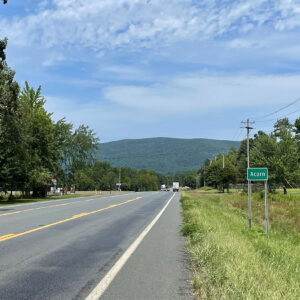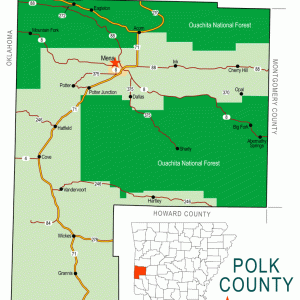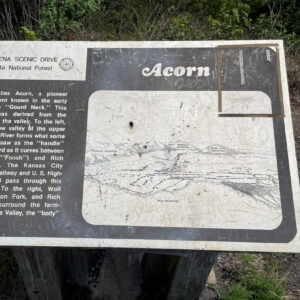calsfoundation@cals.org
Acorn (Polk County)
Originally known as Gourdneck (sometimes written as Gourd Neck, Goardneck, or Gourd Nick), the Acorn community is located approximately six miles north of Mena (Polk County) at the junction of three major highways: U.S. Highway 59, U.S. Highway 71, and U.S. Highway 270.
Interestingly, both town names derived from physical descriptions. The first, Gourdneck, originated from the gourd-like shape of the valley between the Ouachita and Fourche mountain ranges. Starting from Eagle Gap between Black Fork Mountain and Rich Mountain, the area extends into a wider valley to the south and east. The latter name, Acorn, was introduced after the post office was moved near the Kansas City, Pittsburg and Gulf Railroad (KCPG) tracks near present-day Polk County Road 91. That year, a large crop of acorns could be observed on the many oak trees within the community, and the abundance of acorns inspired the town’s new name. (The KCPG was later renamed the Kansas City Southern and was purchased by the Canadian Pacific Railroad in April 2023.)
Prior to Arkansas’s statehood in 1836 and the formation of Polk County in 1844, the earliest settlers arrived in Gourdneck around 1820, seeking free land and home sites. At that time, individuals could stake claims on their land, and such claims were published in local newspapers until adequate time had passed to receive deeds to these lands. No official law enforcement existed at this time, so to maintain order in the community, some residents formed what became known as the Blue Ribbon Gang, so named for the blue ribbons members wore on their sleeves during meetings. This “gang” primarily served to prevent rustlers from invading the community, but they also guarded residents from abuse and other encroachments. This also included concerns of proximity to Indian Territory (present-day Oklahoma). Their strategy involved dividing members into four groups, assigning each group a specified section of the area to patrol.
In 1876, the community established its first school. Students had ten-hour school days, and teacher salaries were relatively meager. Their salaries came from state funding and the generosity of the students’ families, as the state had not enacted local taxes to support schools at that time. The Blue Ribbon Gang dissolved in 1886, just three years after the creation of the Arkansas Sheriffs’ Association. Over the next fourteen years, the town experienced significant growth: the first school tax was levied, new school buildings were constructed to accommodate increasing enrollment, and the growing timber industry added a sawmill and three lumberyards.
A post office was established in Gourdneck in 1892. Previously, residents traveled to Old Dallas (Polk County) to send and receive mail. In 1897, the school granted the railroad access to district lands, which resulted in additional revenue from taxes on rail ties. The same year, the post office was moved near the railroad tracks, prompting the renaming of the station, the post office, the town, and the school to Acorn. The name change was introduced by J. D. Garland, with local sources crediting the inspiration to the wealth of acorns on the oak trees that season. By 1899, the railroad had laid eight miles of track through the school’s land, increasing funds available to the district. By this time, the town included multiple sawmills, weekly church services and a Sunday school, a literary society (though it still retained Gourdneck in its name), a blacksmith, and many acres of fruit farms, orchards, and vineyards.
In December 1907, the Acorn Post Office was discontinued. However, the community, with the help of Postmaster B. F. Petefish, petitioned the U.S. Postal Service to have it reinstated. By April of the following year, the post office had been reinstated, with John Corley serving as the new postmaster.
Between the years of 1908 and 1910, the Mena Weekly Star ran numerous stories of people discovering gold, silver, platinum, and quartz in the area. With this news, prospectors came from all over hoping to strike it rich. Though findings of each ore were confirmed, such findings typically generated more trips to the courthouse than to the bank. Prospectors and homesteaders often sought legal assistance to determine who had more rights—prospectors or homesteaders.
Reports of mining activity ceased until 1917 when two residents discovered more than a ton of manganese, with the potential for copper and zinc. Just two years earlier, Acorn’s post office was discontinued, this time for good. All mail was routed to Mena. By 1918, the Acorn School District had begun its summer teacher training program (called the Normal School), held its first commencement ceremony (with just two graduates), started the Canning and Needlework Clubs (the first school clubs in Polk County), established a nine-month term, constructed a teacherage, and built a dormitory—the first rural school district in Arkansas to do so.
Railroad-related injuries and deaths were not unheard of, but by 1918, their frequency began to increase. In August of that year, a passenger train ran over a young man who was reportedly sleeping on the railroad tracks, splitting his body in half. Three years later, another train accident left the section foreman with a broken leg and other injuries.
During the late 1920s, Oak Ridge re-consolidated with Acorn after creating its own district almost two decades earlier. Between 1929 and 1930, Eagleton, Rich Mountain, Clover Leaf, Holly Springs, and Howard all consolidated with Acorn.
During the 1940s, local news once again centered on two things: KCS accidents and school consolidations. In 1943, there were two KCS incidents: one train accident that claimed the life of an engineer and one KCS truck wreck that also resulted in a death. In 1944, there was a derailment just north of Acorn, but no one was injured. Three people were injured in the wreck of 1945, one of whom later died. Regarding school consolidations, the districts of Corinth, Black Fork (Scott County), and Haw Creek also joined the Acorn School District between 1945 and 1946.
The school saw the addition of a kindergarten program in 1970. In the early 2000s, many rural schools across the state began to consolidate with neighboring schools as a response to Act 60 of 2004. That same year, Acorn opted for an administrative consolidation with Oden (Montgomery County) to create the Ouachita River School District. In the twenty-first century, the district still receives funds from taxes on the railroad. Records from the Polk County Courthouse in Mena show that the Acorn campus received almost two million dollars from railroad taxes between 1989 (the oldest records available) and 2023. The district also receives considerable revenue from the National Forest through the Secure Rural Schools Program. According to the district’s bookkeeper, the district received over three million dollars between 2012 (the oldest records available) and 2023, with payments received from multiple counties—Polk, Montgomery, and Scott—as the district serves students in all three counties. These additional revenue streams have ensured the survival of the small, rural district.
For additional information:
“Acorn Again Has Post Office.” Mena Weekly Star, April 2, 1908, p. 5.
“Acorn Burs.” Mena Weekly Star, December 31, 1908, p. 8.
“Acorn Items.” Mena Star, June 1, 1899, pp. 3, 8.
“Acorn Items.” Mena Star, August 10, 1899, p. 4.
“Acorn Loses Post Office: Order Went into Effect Yesterday—Acorn Mail Held at Mena.” Mena Weekly Star, December 5, 1907, p. 5.
“Acorn Public School.” Mena Weekly Star, January 17, 1918, p. 10.
“Acorn Sprouts.” Mena Star, April 6, 1899, p. 6.
“Acorn Stems.” Mena Weekly Star, April 12, 1906, p. 8.
“All Seeking Gold: Magic Word Has Stirred Mena People, Who Are Taking All Available Claims Near Acorn.” Mena Weekly Star, November 26, 1908, p. 3.
Dreyfus. “Acorn Sprouts.” Mena Star, March 8, 1899, p. 2.
Garland, Ama, and Elsie Allred. “Acorn School.” In School Records of Polk County, AR. Mena, AR: Polk County Historical Society, 1969.
———. “Acorn School.” Mountain Signal 1, no. 12 (June 1990): 11–16.
“Gold Fields in Court: Prospectors Seek Restraining Order against Homesteaders Who Forbid Their Working.” Mena Weekly Star, January 28, 1909, p.1.
Kimp, Margo Reed. Acorn School and Acorn Community History. N.p.: 2023.
Martin, Eva. “Towns and Communities of Early Day Polk County.” In A Book of Lists from Newsletters of the Polk County Genealogical Society 1986-1995. Hatfield, AR: Polk County Genealogical Society, n.d.
“Mining Activity at Acorn.” Mena Weekly Star, February 15, 1917, p. 1.
“News Notes and Personals.” Mena Weekly Star, December 5, 1907, p. 8.
Payton, Ralph. “The History of Acorn School #30 – 1878.” Mena Weekly Star, August 27, 1936, p. 15.
“Slept on Railroad Track: And Passenger Train Cut in Two Body of Curtis Meeks.” Mena Weekly Star, August 15, 1918, p. 7.
“Strike Body of Manganese.” Mena Weekly Star, January 18, 1917, p. 5.
“Successful Fruit Growers: The Cherry Fruit Farms at Mena and Acorn to be Enlarged.” Mena Star, July 27, 1899, p. 5.
“William Pettigrew Injured: Suffered Broken Leg and Other Injuries—Taken to Hospital.” Mena Weekly Star, February 3, 1921, p. 8.
Mysti L. Gates
University of Arkansas Rich Mountain
 Acorn School
Acorn School  Entering Acorn
Entering Acorn  Overlooking Acorn
Overlooking Acorn  Polk County Map
Polk County Map  Talimena Scenic Drive Sign
Talimena Scenic Drive Sign 




Comments
No comments on this entry yet.